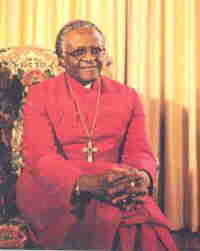 Desmond Mpilo Tutu Desmond Mpilo Tutuanti-apartheid leader, Nobel Peace Prize
winner, Archbishop of South Africa
Desmond Mpilo Tutu was born in
Klerksdorp in the North West Province (formerly
Western Transvaal), South Africa, on October 7,
1931. He attended school in Johannesburg,
obtained a teachers' diploma at the Pretoria
Bantu Normal College in 1953, and received his
B.A. degree through the University of South
Africa in 1954.
After three years as a high
school teacher in Krugersdorp, Tutu left to study
theology at St. Peter's Theological College; he
became a deacon of the Anglican Church in 1960,
and a priest in 1961. From 1962 to 1966 he
continued his theological studies in England,
receiving his Master of Theology degree.
Returning to South Africa, he taught theology at
the Federal Theological Seminary in the Cape and
at the University of Botswana, Lesotho and
Swaziland. In 1972 he returned to England and
spent three years as the assistant director of a
theological institute in London. In 1975 he was
appointed Dean of St. Mary's Cathedral in
Johannesburg, the first black to hold that
position. From 1976 to 1978 he was Bishop of
Lesotho; in 1978 he became the first black
General Secretary of the South African Council of
Churches.
Desmond Tutu is most known to
the world through his efforts to rid South Africa
of apartheid -- a government-sanctioned system of
segregating whites and blacks in almost all
matters of public life. Tutu emphasized that the
only way South African blacks could rid
themselves of apartheid was through peaceful
means. He worked to convince other countries to
help in South Africa's struggle, and was
instrumental in getting many nations to invoke
economic sanctions against South Africa. In 1980
the South African government revoked his passport
in reprisal for his international actions. In
1984 he was awarded the Nobel Peace Prize in recognition of "the courage and
heroism shown by black South Africans in their
use of peaceful methods in the struggle against
apartheid." Tutu used his prize money to
establish the Southern African Refugee
Scholarship Fund, enabling disadvantaged students
to further their studies.
Tutu became Bishop of
Johannesburg in 1985, and Archbishop of Cape Town
and head of the Anglican Church in Southern
Africa in 1986. In 1996 he retired as Archbishop
and became Chairperson of the Truth and
Reconciliation Commission in South Africa.
Tutu's publications include: Crying
in the Wilderness and Hope and Suffering,
collections of sermons and addresses; and The
Rainbow People of God, which includes
biographical material and background narrative by
John Allen.

The Desmond Tutu Peace Centre www.tutu.org

Nobel Peace Prize
Questions or comments about
this page?
|



